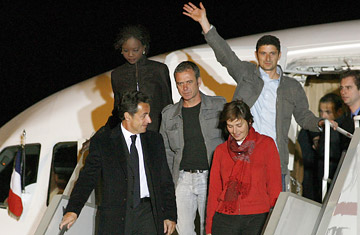
Nicolas Sarkzoy arrives with French journalists Marie-Agnes Peleran, Jean-Daniel Guillou and Marc Garmirian at the military airport of Villacoublay, near Paris on November 4, 2007.
French President Nicolas Sarkozy is proud of his reputation as a take-charge leader boasting an impressive string of international diplomatic coups to his bow. Indeed, his first three highly touted months in office owed most of their glow to his deft performance on the world stage — a shine that dimmed during the following three months spent largely at home. But by flying to Africa to personally bring home seven Europeans involved in the child kidnapping case that Chadian authorities have lodged against French charity group Zoe's Ark, Sarkozy may be on the receiving end of tough questions being asked at home about his real motivations.
Sarkozy flew down to the Chadian capital of N'Djamena on Sunday to finalize the release and return of three French journalists and four Spanish crew members of a jet Zoe's Ark had chartered to airlift 103 children it claimed were orphans from Darfur. Chadian police in the eastern city of Abéché moved in to stop the plane from departing on Oct. 25, amid charges the group was planning to sell the children to adopting parents in France. Since then, police and U.N. agency investigations have discovered most if not all the 103 children are not orphans nor from Darfur — but instead were taken from villages in Chad by what witnesses say were white aid workers promising to give the children money, schooling or candy. Initial accusations by Chadian President Déby that the group of 17 suspects were part of a "pedophile" organization involved in "child trafficking" were later modified to official charges ranging from "kidnapping" to complicity. The seven Europeans flown home aboard Sarkozy's presidential plane remain under investigation, and are expected to stand trial for having failed to prevent the unauthorized expatriation of the children for adoption — an illegal act in Chad.
Condemnation of Zoe's Ark for trying to sneak the children out of Africa and into the care of French families has been almost universal — including by Sarkozy. But French human rights and civil liberties groups objected to the jailing of the journalists and flight crews — workers, their defenders had argued, who'd only been doing their jobs without playing an active role in the scheme to hustle the children out of Chad. Their release therefore drew cheers in Europe but a surge of protest in Chad, where some believe the white suspects in the case are being given deferential treatment normal Chadians could never hope for. Press reports from Chadian capital N'Djamena are replete with residents expressing concern that the release of these seven following Sarkozy's intervention may be an initial step to all 17 ultimately being transferred to France — either via extradition accords, or through political deal-making.
Such worries are what make Sarkozy's involvement potentially problematic — especially given his expressed desire to see all "French nationals be judged by the French legal system." Even before Sarkozy's arrival, many French opposition politicians asked whether French government officials had long been aware of Zoe's Ark's intention to smuggle the children out of Chad, but failed to do anything about it. Sarkozy looks destined to face criticism either way: that he didn't originally do enough to obtain the extradition of Zoe's Ark workers; or he did, and thus showed disdain for Chad's justice system.
But there are objections from many differing strands of French politics over Sarkozy's high-profile role in the case — one reminiscent of his successful push last July to secure the freeing of six Bulgarian medics facing capital punishment on trumped-up murder charges in Libya. Though Sarkozy came away from that looking like a hero, allegations swirled in its wake that he'd not only stolen the thunder from nearly completed European Union efforts to secure the Bulgarian's liberty, but had done so by paying millions of dollars in "compensation" to Libya. At around this time France also cut military and energy deals with Tripoli. A parliamentary panel continues to investigate the details behind French negotiations with Libya, and get a full accounting of what agreements were actually made. Many now wonder whether any deals were cut by Sarkozy with Déby to earn the release of the seven initial Zoe's Ark suspects.
"You can't lead a nation acting like Zorro," fumed Socialist parliamentarian Jean-Louis Bianco over Sarkozy's Chadian coup. "This sensationalist diplomacy continues posing problems," agreed fellow Socialist Pierre Moscovici. France's media was torn between approbation and concern. Le Figaro's headline Monday hailed "Nicolas Sarkozy's Humanitarian Coup" and nicknamed him "the Jack Bauer of diplomacy," referring to the secret agent star of 24. Le Parisien, however, claimed "Nicolas Sarkozy can't resist the permanent temptation to stage his action as if he's the only person involved". One way or another, as with the fictional television program, the clock was ticking as another day of dramatic developments took place in this confusing case.
